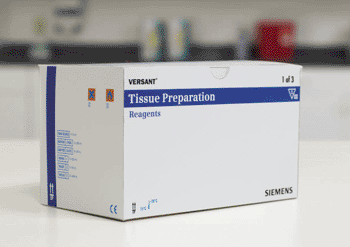New Tissue Preparation Solution Enables Increased Efficiency for Molecular Pathology Laboratories
By LabMedica International staff writers
Posted on 27 Nov 2013
A new tissue preparation system now enables automated extraction of high-quality nucleic acids from fresh frozen tissues as well as from formalin-fixed paraffin embedded (FFPE) tissues. Posted on 27 Nov 2013
Siemens Healthcare Sector (Malvern, PA, USA) now offers its “Tissue Preparation Solution,” which includes a Tissue Preparation System and the Versant Tissue Preparation Reagents kit. Fresh frozen (FF) tissues are typically used for quick diagnosis of patients undergoing surgery, for research, or for tissue collection and storage. Formalin-fixed, paraffin embedded tissue clinical samples are routinely prepared from tissues obtained from surgeries and biopsies. FF tissue samples usually require separate workflows and specific kits not compatible with FFPE tissues, making the integration of these two processes a challenge for molecular pathology labs. Now, the consolidation of both tissue types on the Siemens Tissue Preparation Solution provides the only automated solution currently available for standardized isolation of nucleic acids from both FF and FFPE tissue samples such as those obtained for in vitro diagnosis and research.

Image: The VERSANT Tissue Preparation Reagents Kit (Photo courtesy of Siemens Healthcare).
Before the introduction of this Siemens solution, laboratories were limited to systems that were either manual or only automated for certain steps of the process. “When compared to other manual and semi-automated procedures, the Siemens method really sets a new standard in quality and workflow efficiency for routine molecular pathology laboratories,” commented Manfred Dietel, MD, Director of Institute of Pathology, University Hospital, Charité Berlin (Germany).
Using magnetic particle-based isolation and proprietary bead technology, this solution provides a more efficient and reproducible process for the isolation of high-quality nucleic acids from FFPE tissue. It features an automated process including the integration of deparaffinization; eliminates centrifugation steps associated with deparaffinization; enables coextraction of DNA and RNA from a single extraction process with a single set of reagents; provides a standardized lysis step for all samples; delivers highly reproducible results; and processes up to 48 samples in about 4 hours. Laboratory safety and environmental quality are also enhanced as hazardous organic solvents are eliminated with the deparaffinization process.
Related Links:
Siemens Healthcare









 Analyzer.jpg)



